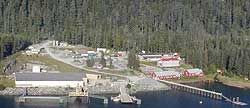Framework for Responsible Mining:
A Guide to Evolving Standards
 Greens Creek Mine on Admiralty Island, AK. Credit: Kennecott |
Retailers and other businesses have recognized the risks associated with damage to reputation and brand value from association with irresponsibly sourced and produced products. Consumers in some industrialized countries have also shown preference for environmentally and socially responsible choices, and investors and insurers have begun to understand and respond to financial benefits that can accrue from lowered environmental and social risks.
Recognizing these trends, some corporations have moved to distinguish themselves from their competitors by subjecting their operations to independent scrutiny and establishing a verifiable chain-of-custody. A necessary element of any such system is agreement on a set of environmental and social principles, standards and criteria against which a mining operation can be tested.
The purpose of the Framework for Responsible Mining is to serve as a catalyst for a multi-sector dialogue that leads to the adoption of such principles, standards and criteria.